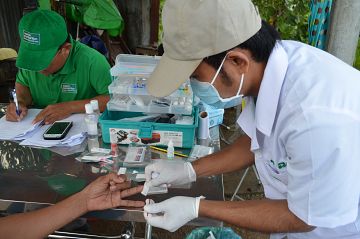Virtual Microbiology and Infectious Disease Summit 2022 explores malaria diagnostics
18 May 2022
Yesterday, the Virtual Microbiology and Infectious Disease Summit 2022 hosted a selection of world-leading health experts in microbiology and infectious disease, presenting on a range of cutting-edge public health topics via live Q&As, video interviews and interactive sessions. The speaker videos can be accessed through registering on the event website.
Dr Jane Achan, Malaria Consortium Principal Advisor, shared her insights at the Summit on the opportunities and challenges around malaria diagnostics and testing. For point of care testing, malaria rapid diagnostic tests (mRDTs) are a quick, reliable method of diagnosing malaria – essential for ensuring prompt diagnosis and treatment in infected persons and preventing progression to severe illness. Since 2010, the World Health Organization (WHO) has recommended universal parasite-based diagnosis before treatment – mRDTs make this possible in nearly any setting.
Dr Achan emphasised the importance of malaria diagnostic tools and strategies:
“Malaria diagnostic tools, especially point of care diagnostics, are a vital component of effective malaria case management. Given current challenges with their use and availability, there is a continued need for implementation research to optimise malaria diagnostics in the public sector, private sector, and community-based programmes. The increased use of parasitological diagnosis gives the potential for more reliable surveillance data and disease burden estimates.”
Malaria Consortium provides technical assistance at all levels of the health system to fight infectious diseases including malaria, leading interventions that emphasise locally led development. Many of its programmes include a training component, ensuring that local health workers can use cost-effective tools for diagnosis and treatment and those most vulnerable to malaria and other communicable diseases can receive quality services with far greater ease of access, less economic burden, and without needing to travel several hours to a hospital.
Separate discussions at the Summit focused on infectious diseases, the microbiome, antimicrobial resistance and an emerging intervention in the form of gene drives – a novel approach discussed last week by Malaria Consortium’s Technical Director, James Tibenderana, on the 80,000 Hours Podcast.
Keywords: Treatment | Diagnosis
Related content
18 May 2021
Community health workers are key to successful malaria elimination projects in Cambodia during COVID-19
21 December 2021Study finds impressive improvement in malaria testing rates at health facilities in Uganda
Latest news
- Malaria Consortium honoured by Ugandan government for contribution to combat malaria23rd April 2024
- International summit calls for AMR accountability in public health interventions21st March 2024
- Global SMC community celebrates new milestone at SMC Alliance Annual Meeting in Nigeria6th March 2024
- Scaling up key interventions could halve pneumonia-related childhood mortality13th February 2024
- Malaria Consortium and eGov Foundation join Mozambique’s national malaria programme to digitalise seasonal malaria chemoprevention campaigns8th February 2024
- World’s first malaria vaccine rollout launched in Cameroon22nd January 2024